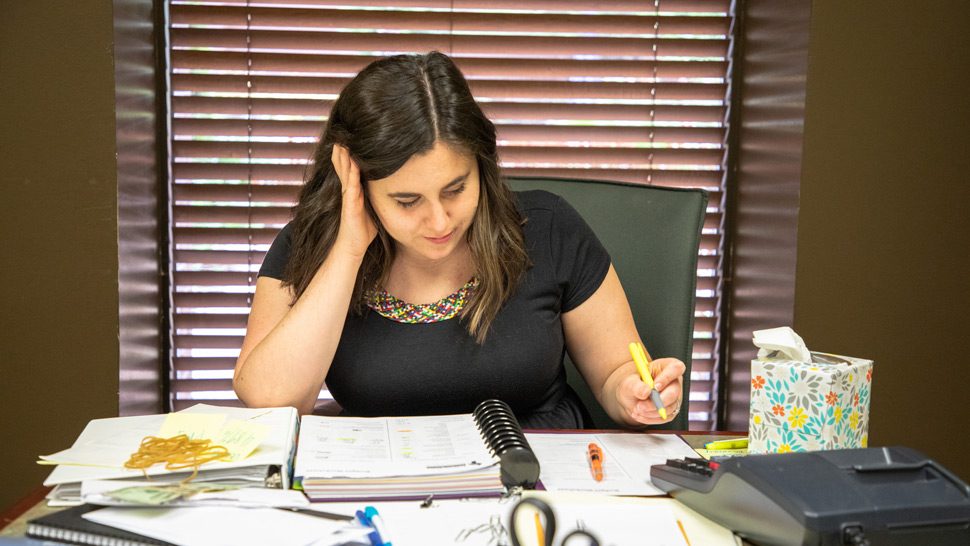There are times I’ve stayed up all night thinking about making a big purchase. I’ve thrown out tons of hypothetical ‘what ifs’ and ‘whys’ for days upon days before actually taking time to sit down, look at my accounts, and do some calculations to help ease or support my concerns.
According to a 2018 WalletHub survey of financial literacy in America, Louisiana is currently the lowest-ranked state in the country. The majority of us didn’t learn about budgeting or interest rates in schools.
Luckily, now more requirements are being put into place for future generations. But, where does that leave a lot of us?
For me, I was left to seek out resources and ask questions on my own. Even though I worked at a credit union, it was still stressful to tackle the home buying process when the time came and even purchase a vehicle for the first time.
I was lucky enough to have a big support system of coworkers, tons of resources at my fingertips, and even access to Pelican’s Nationally Certified Credit Counselors to get through the process.
I know that I am definitely not alone, and I wanted to dig a little deeper into these feelings that still float around when I think about my finances. I asked J. Star Marks who is a Board-Approved Licensed Professional Counselor Supervisor, a Licensed Marriage and Family Therapist, and Licensed Addiction Counselor in Louisiana some questions to do just that.

I’m happy to share her insights and expertise with you:
How do I know if I have financial anxiety?
One report in 2016 by financial services company Northwestern Mutual states that 85% of Americans report feeling some level of anxiety about money.
Financial anxiety shares many characteristics of generalized anxiety disorder such as excessive worry, irritability, and difficulty concentrating. Although it is not officially recognized as a diagnosis, many people report feeling some type of anxiety or fear around money.
This fear is not limited to any particular income level, race, or gender. Financial anxiety can impact all generations and genders and does not appear to discriminate.
What causes financial anxiety?
Some financial anxiety is caused by your childhood experiences surrounding money.
This can be watching or hearing your parents struggle with money issues, the loss of a parent’s job, or foreclosure as a child. Perhaps your own loss of income or choices with money throughout your life will also add to this.
Living in a state ranked low for financial literacy, am I more prone to financial anxiety?
Financial literacy is defined as the possession of the set of skills and knowledge that allows an individual to make informed and effective decisions with all of their financial resources.
Without this skill set, you will be more likely to make poor financial decisions which, in turn, would lead to higher levels of financial anxiety.
Is there a difference between financial stress and financial anxiety?
Some financial stress is unavoidable, and almost everyone experiences it from time to time.
Financial anxiety, however, is more chronic and can be a debilitating issue. Financial anxiety will be present in more areas of your life—not just your money concerns. It may also start to impact your health and relationships with others.
How could financial anxiety affect me?
Financial anxiety can effect both your quality of life with regards to your financial future as well as your future health and wellness.
Chronic stress impacts your weight, blood pressure, heart health, cognitive functioning, and many other daily health factors.
What are the initial steps you should take when you realize you have it?
ASK FOR HELP.
Look for resources at your local credit union or bank. Many financial institutions have staff members within their system that are specifically trained to get you the resources you need.
Don’t assume that you can do this on your own. Plenty of people have been in the same place you are and have made choices to get financially healthy.
Also think about reaching out to a local therapist in your area. It may be a deeper issue with money that you need to look at.
Want to confidentially talk with someone one-on-one?
Click here to reach out to a Nationally Certified Credit Counselor and set up a meeting today!What are some ways to help curb it and then manage it long term?
Set goals, set a budget, and find an accountability partner. If you are married, make this a goal for your marriage so that one person isn’t carrying all of the stress and workload for this.
Set both short and long-term goals for yourself. Make them realistic. Don’t set such a strict budget that you will not be able to stick with it. With a very strict budget, you are automatically setting yourself up to not follow it.
Exposure therapy can go a long way to combat financial anxiety. Get comfortable with your finances. Check your accounts and keep up to date on your statements. Take a money management class at your local church or university—some are even offered online.
What should I NOT do? To what extent do you recommend talking to coworkers, friends, and family?
Don’t panic, don’t ignore it, and don’t assume it will just go away over time. Talking to coworkers, family, and friends can be tricky.
Ask yourself what talking to someone will do for you. Do they have knowledge of the subject that can benefit me? Do they support me in general? Can I trust this person to give me good advice or to just be a solid person to hear my burdens?
Do you feel that social media has any impact on financial anxiety?
Social media can impact financial anxiety by setting up comparative structures around what others are able to do or portray themselves as doing.
Try to view social media as simply entertainment. Keep realistic boundaries in mind when viewing what others are posting. Remember most people are posting what they want others to see and not the reality of their own daily struggles.
What do you recommend that I do to stay healthy emotionally and not just financially?
Move your body and spend time with friends and family. Create financially-friendly events that bring you closer to the people and things that bring you joy. Over time and with the right support systems you can begin your path to financial and emotional wellbeing.
You can feel relief knowing that you are not alone. It’s important to step back, look at the whole picture, and remind yourself that there are so many resources out there to support you in your journey both emotionally and financially.
Do you have any tips for conquering financial anxiety? Let us know in the comments below!
Work addict obsessed with all things craft and credit union related. I enjoy binge watching television shows with my husband. Marketing enthusiast. Food lover. Proud puppy mom.




Assistance